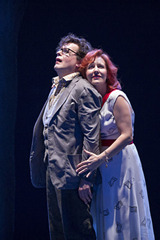| Opera Reviews | 29 April 2024 |
Julietta is very welcome at the Coliseumby Colin Anderson |
|
| Martinu: Julietta English National Opera 17 September 2012 |
|
|
Julietta is very welcome at the Coliseum, in a new to London if not-new production directed by Richard Jones; it has previously been seen in Paris and Geneva. A giant piano-accordion dominates the stage, save for Act II where we are in an enchanted moonlit forest. To begin, Michel is having a troubled sleep. He sets off to a coastal town to re-find the love of his life, Julietta. There he encounters some strange folk, most unsure of their past and of their identity. Peter Hoare is superb and tireless as Michel. As Julietta, Julia Sporsén is attractive of voice and personality. At times Julietta and Michel seem made for each other, until troubles set it, and he shoots her. Or does he? And does Julietta exist anyway? It doesn't matter, for the story is what you make of it, and there is no right or wrong way of calling it. Not surprisingly the scenario turns full-circle; at the close Michel is once more in restless sleep until he is off again on his travels (dreams), the events that we have already witnessed about to be repeated. The varied and wacky characters keep the story on the move, and Jones's direction is full of flair and insight, seconded by some imaginative designs, costumes and lighting. Contributions from such as Jeffrey Lloyd-Roberts, Andrew Shore, Henry Waddington, Gwynne Howell, Susan Bickley and Anthony Gregory are impressive. David Pountney's English words carry well (English surtitles clarify if needed), and the ENO Chorus is in lusty collective voice. But no discussion of Julietta can be taken seriously without detailed mention of the music itself and how the orchestra and conductor present it. In the first instance, Martinu's music is fantastic and fantastical. It is emotionally charged, it is vivid and intoxicating, full of wonderment, it dances and it tugs at the heartstrings. To continue ... it is radiant and ravishing and drips with colour through Martinu's trademark mosaic-like scoring. Stravinsky was an influence, a debt returned by a surely deliberate (and affectionate) nod to Petrushka in Act I. If there was a divine time to be in the Coliseum it is at the end of Act II when Martinu finds a glowing poignancy in the harmony and orchestration that really gets under the listener's skin in the best possible way. These many aural delights (including the haunting use of an accordion, so evocative and so Parisian) are marvellously distilled by the ENO Orchestra, fresh and assured, responding with brilliance, subtlety and sensitivity to Edward Gardner's conducting. He seems to believe in every note. His pacing of the score is ideal; and the clarity of detailing and the enthusiasm of the playing suggest this orchestra and conductor's appreciation of the score is everything it should be and has been painstakingly prepared. It's an opera that can be relished without a staging; that the latter is simpatico to the music is a bonus. Highly recommended! |
|
| Text ©
Colin Anderson Photo © Richard Hubert Smith |

 Dream
or reality? A bit of both? A town's inhabitants have few individual
memories. Such is the story of Julietta (as anglicised by ENO).
Based on Georges Neveux's play Juliette, ou La Clé des songes,
Bohuslav Martinu set a French libretto, later translated into Czech,
and the opera was first heard in Prague in 1938. Of Martinu's sixteen
operas, Julietta is the best-known alongside his final stage-work,
The Greek Passion (1957/59).
Dream
or reality? A bit of both? A town's inhabitants have few individual
memories. Such is the story of Julietta (as anglicised by ENO).
Based on Georges Neveux's play Juliette, ou La Clé des songes,
Bohuslav Martinu set a French libretto, later translated into Czech,
and the opera was first heard in Prague in 1938. Of Martinu's sixteen
operas, Julietta is the best-known alongside his final stage-work,
The Greek Passion (1957/59). 





